If you believe the headlines, President Donald Trump is in deep trouble. The great impeachment saga is gathering pace. House Intelligence Committee chairman Adam Schiff has been conducting closed-door interviews as part of his investigations into whether the President abused his executive power in his efforts to dig up dirt on his political rival, Joe Biden, the former vice president under Obama. Did Trump threaten to withhold military aid to Ukraine unless its government told him what he wanted to hear? More leaked transcripts this week suggest that he did. Gordon Sondland, a US ambassador to the European Union and a Trump ally, has now dropped his Commander–in-Chief in it by suggesting that the Trump administration did insist on a quid-pro-quo deal. Gotcha!
The trouble is, nobody believes the headlines. The transcripts turn out to be far less damning than excited news reports make out, and anyway the leaks are coming from House Democrats who are determined to hurt Trump at any cost. Everybody knows that impeachment will almost certainly not result in Trump leaving the White House: for that, two-thirds of the Republican-majority Senate would have to vote to remove him.
Impeachment is therefore a mere sideshow to the presidential election next year. The Democrats realise that they cannot (and probably should not) oust Trump by non-democratic means. But accusing him of high crimes and misdemeanours is a handy way of distracting from their more fundamental problem: their party’s embarrassing inability to produce a candidate who can beat him at the ballot.
To win an election against Donald Trump should not be a difficult task — at least in theory. His leadership of the free world may not have been the apocalyptic disaster so many expected, but it has hardly been a roaring success. America’s economy has boomed, but the nation’s deficit has ballooned. Employment has hit historic highs, but a study released this week says two-thirds of Americans don’t feel better off. Trump has not started any new wars, but he hasn’t ended any old ones. Trump’s base may adore him, but a majority of Americans still dis-approve of the job he is doing.
You’d think, then, that in an ingenious country of 330 million souls, brilliant Democratic candidates would be lining up to thrash Trump at the ballot. Well, the runners have lined up, 17 at the latest count, and they aren’t at all brilliant. They all preach about the evil of Trump and the need to save America. But what truly unites them is a mesmerising mediocrity.
This is the great secret of Trump’s success: he’s blessed with rubbish opponents. Next year, he will face another challenge from his own side. That diminishing Republican ‘NeverTrump’ faction, which consists largely of newspaper columnists, will again try to stop him winning their party nomination. They will almost certainly fail. Trump’s enemies will take comfort from polls that suggest any leading Democrat could beat him in November. But there’s also a gnawing sense that, when it comes to the rough and tumble of a presidential election, none of their candidates has what it takes. As campaigners, all are considerably worse than the orange beast in the Oval Office.
The Iowa caucus, the first real test of the Democratic primary, is less than 100 days away, and the situation is so dire that some Democrats have started to fantasise about a Donald Trump vs Hillary Clinton rematch — including, it seems, Hillary herself. ‘Don’t tempt me,’ she tweeted recently, after Trump teasingly suggested that she run again.
Hillary may be deluded, but she’s smart enough to see that the 2020 Democratic primary is a calamity. Take Elizabeth Warren, the Massachusetts Senator who is now the bookies’ favourite to be nominee. Last week, she finally released her much–anticipated ‘Medicare-for-all’ plan, a key part of her radical agenda. She’d been ducking the big question about it for months: how might she, as president, find the $50 trillion needed for a total government takeover of healthcare in the richest country on earth?
Even Bernie Sanders, the rival from whom she pinched the idea, has admitted that hard-working Americans would have to pay more. But Warren, formerly a Harvard professor, subscribes to the influential academic theory that money grows on magic trees. Ninety-nine per cent of Americans will pay not a cent more for free, world-class medicine, she insists. Warren says that she can fund her scheme through ‘targeted spending cuts, new taxes on giant corporations and the richest 1 per cent of Americans’. Abracadabra! Experts and opponents quickly rubbished her figures. Her rival for the nomination, Joe Biden, called it ‘mathematical gymnastics’. Others asked how a woman who presents herself as a policy wonk — ‘I’ve got a plan for that’ is one of her mantras — could have got something so important so wrong.
On closer inspection, everything about Liz Warren is phoney — not just her bogus claims that she’s authentically Native American. She posts naff videos of herself drinking beer at home like a regular girl. She tells voters she’s Wall Street’s worst nightmare, then tells bankers she’ll work with them. She’s a populist firebrand only for rich people. The best hope for actual left-wingers is that she’s just pretending to be fake to get past the establishment machine.
The bad news for Trump’s enemies is that Warren may indeed be the most eligible Democrat. Sanders, a more authentic and likeable radical, is 78 and recovering from a heart attack. His campaign is a shadow of his near-successful 2016 effort. Joe Biden is still ahead of Warren in the polls — a survey this week showed that he stands the best chance of winning the White House. He offers ‘name recognition’, glimpses of charm, and says ‘folks’ so often that folks tend to like him. He’s more centrist than Warren or Sanders, too, and that appeals to much of America. The problem is that he’s now 76 and a bit gaga. He seems unfocused; all hair plugs and no purpose. His staff apparently spend much of their time trying to stop him extemporising. He’s understandably distracted by all the talk about what he and his son were up to in Ukraine, and a suspicion lingers that he doesn’t really want to be running. His nomination would confirm the Democrats’ stunning inability to find a fresh face.
There are two quite exciting Democratic candidates: Tulsi Gabbard and Andrew Yang. Gabbard is a Samoan-Hindu surfer and military veteran who hates wars and Saudi Arabia; Yang is a tech entrepreneur whose slogan is ‘Make America Think Harder’. Sadly, they are both a bit too unorthodox. Gabbard is only still in the race because Hillary Clinton went too far by calling her a ‘Russian asset’. Being denounced by the Clintons is always good for a candidate’s popularity.
This time last year, the great liberal hope was Beto O’Rourke. Some commentators called him the White Obama (until other commentators said that moniker was problematic). But Beto quickly turned into a joke. After losing his Texas Senate race to Ted Cruz, he launched one of the more pathetic presidential election campaigns in recent history. Last week, polling below 1 per cent, he bowed to the inevitable and stood down. Trump, magnanimous as usual, called him ‘a poor bastard … he made a total fool of himself’. Nobody said politics was kind.
This year’s biggest Democratic flop has arguably been Kamala Harris, the junior Senator from California. Jamaican-Indian by heritage, Harris seemed to be the strong ‘woman plus minority’ candidate Democratic strategists had long dreamed about. She drew 20,000 to her launch and talked about unity. Yet her whole campaign seemed to revolve around accusing others of racism and sexism. She’s now polling at 3 per cent, and has taken to saying that Americans are just ‘not ready for a woman of colour’.
Pete Buttigieg, the gay mayor of South Bend, Indiana, has replaced Harris in fourth place behind Joe, Liz and Bernie. Buttigieg is highly educated, amiable and eloquent. He kisses his husband on stage, which thrills Instagram users. In one poll in September, however, Buttigieg scored zero per cent with African-American voters, arguably the Democratic party’s most significant constituency. Maybe African-Americans are just not ready for a gay president.
Identity politics and the growing appetite for full-bore socialism are eating the Democratic Party alive. Wannabe Democratic leaders feel they must honour the shibboleths of the new left in order to earn the party nomination in July. But they also know that, in order to defeat Donald Trump, they must appeal to more conservative-minded voters. How can they do that having promised socialised medicine, war on traditional notions of sex, gun confiscations, and an end to carbon emissions by 2030?
This radical takeover is all quite new. Until 2016, calling for fully socialised medicine was a fairly fringe position in America; now it’s mainstream. Barack Obama didn’t support cash reparations to make amends for the sin of slavery; now most 2020 candidates wholly endorse the idea.
Most Americans aren’t interested in trans issues, but at the recent CNN LGBTQ Democratic Townhall, candidates talked of little else. Those who tried to discuss gay or lesbian issues were shouted down for not taking the troubles of trans people seriously enough. The party’s grip on reality has slipped: one candidate, Julián Castro, even argued that trans women (i.e. people who don’t have wombs) should be granted full access to abortion services.
More savvy Democratic leaders can see that these mad contortions are electoral suicide in a country as politically diverse as America. Nancy Pelosi, the speaker of the House of Representatives, understands the problem. ‘What works in San Francisco does not necessarily work in Michigan,’ she said last week. ‘Remember, November. You must win the Electoral College.’
Pelosi is right to be afraid. A survey last week tested various Democratic candidates in six key swing states that Clinton lost in 2016: Arizona, Florida, Michigan, North Carolina, Pennsylvania and Wisconsin. It concluded that none could carry them all. Warren would lose to Trump in five of the six.
This partly explains why Pelosi is now pursuing impeachment. The more time her party spends agreeing that Donald Trump is a terrible baddie, the less they’ll discuss how to ban cars or penalise churches that don’t embrace gay marriage and trans rights — talking points which don’t exactly resonate with most Americans.
The funny part is that Trump seems to welcome the impeachment fuss, too. He’d rather be tweeting about WITCH HUNTS than his failure to, say, build a wall or scrap Obama’s Affordable Health Care. He’s far more comfortable counter–punching opponents than he is worrying about why most Americans don’t seem to like him.
Hope and change? Forget it. Given the lack of talent on offer, the 2020 election will almost certainly be a warped repeat of 2016, in which two deeply unloved candidates each attempt to show that the other is more despicable. No wonder Hillary is tempted.
Got something to add? Join the discussion and comment below.
Get 10 issues for just $10
Subscribe to The Spectator Australia today for the next 10 magazine issues, plus full online access, for just $10.
You might disagree with half of it, but you’ll enjoy reading all of it. Try your first month for free, then just $2 a week for the remainder of your first year.




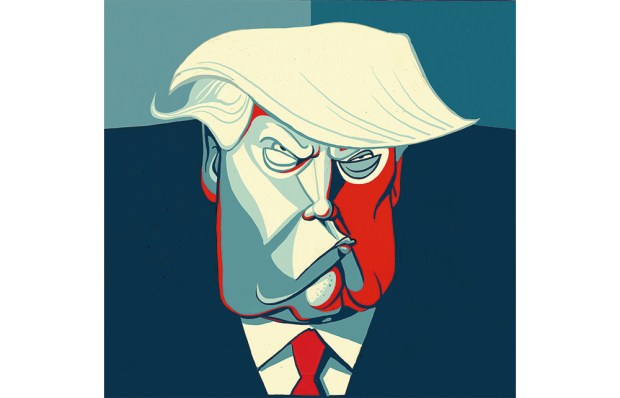
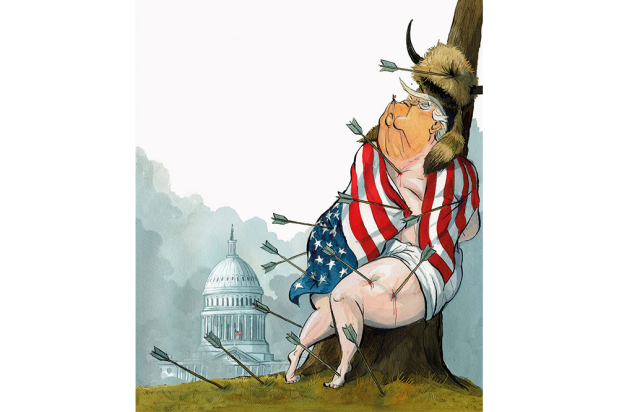
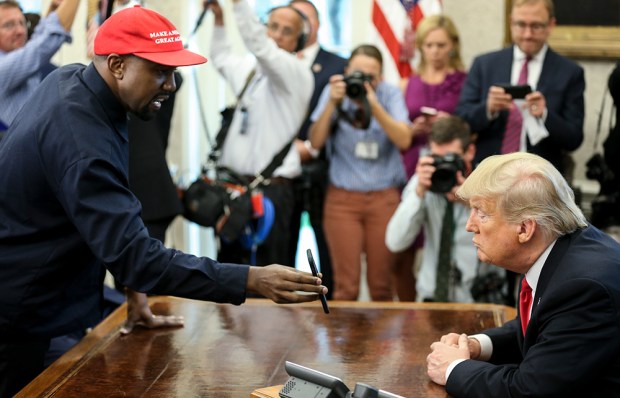
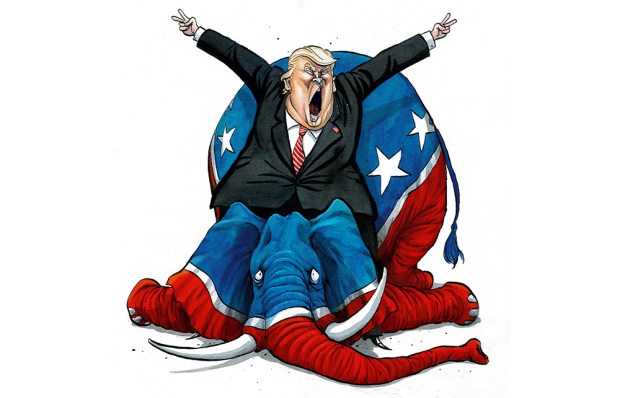
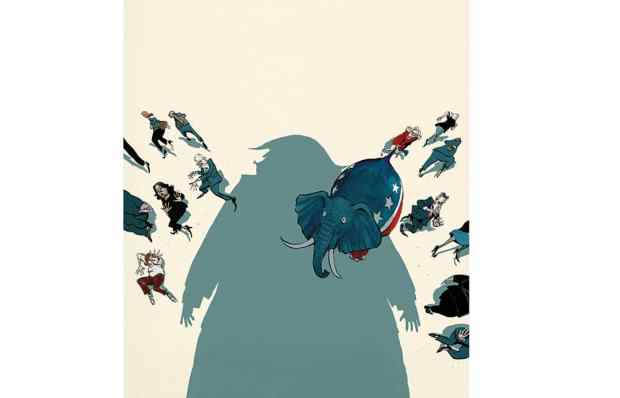






Comments
Don't miss out
Join the conversation with other Spectator Australia readers. Subscribe to leave a comment.
SUBSCRIBEAlready a subscriber? Log in